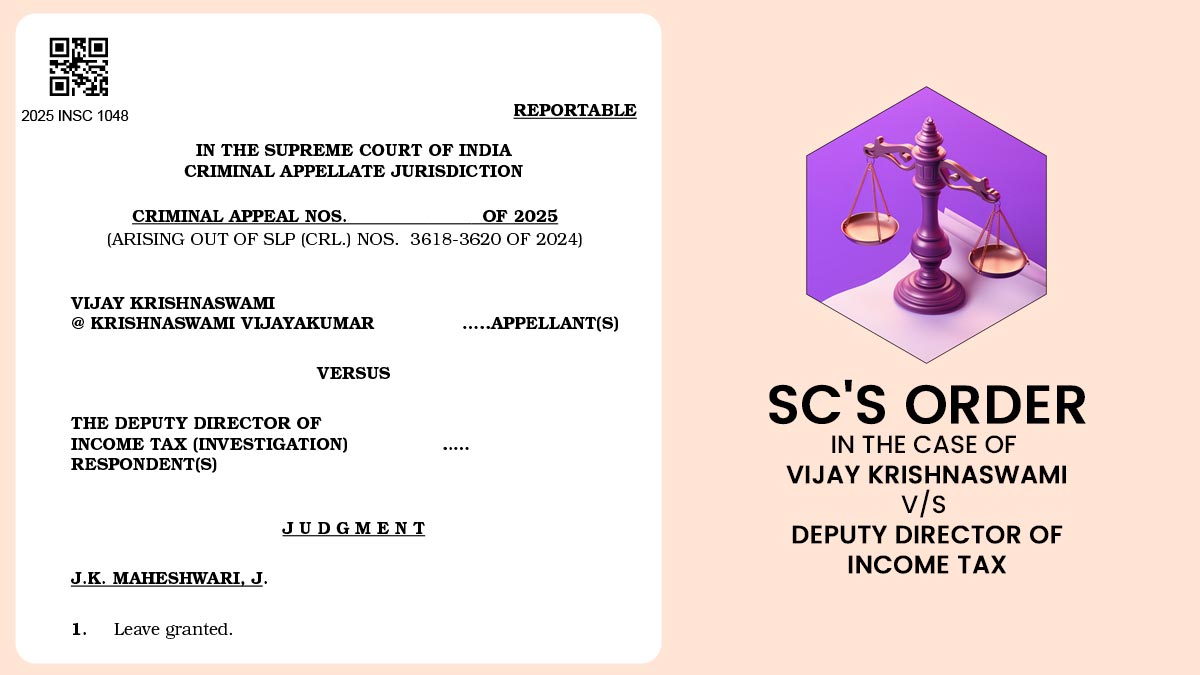
A message has been expressed by the Apex court to the Income Tax Department, quashing prosecution proceedings against taxpayer Vijay Krishnaswami and charging a Rs 2 lakh on the Revenue for acting in “blatant disregard” of binding Central Board of Direct Taxes (CBDT) circulars.
For “wilful non-compliance”, a bench of Justices J.K. Maheshwari and Vijay Bishnoi criticised the Department, holding that the conduct vandalises fairness, consistency, and accountability in tax administration.
The Case of Judgement
Under Section 132 of the Income Tax Act, the case emerged from a search operation in April 2016, where officials seized unaccounted cash worth Rs 4.93 crore from the taxpayer. U/s 276C(1), prosecution was sanctioned in June 2018 for alleged wilful tax evasion.
The taxpayer in December 2018 approached the Settlement Commission, making additional disclosures. The Commission, in November 2019, granted immunity from penalty, keeping that no intended attempt was there to evade tax, but because of pending litigation, it has withheld the immunity.
The Madras High Court dismissed the plea of the taxpayer against prosecution, leading to an appeal to the Supreme Court.
Key Problems Before the Court
The question was whether prosecution u/s 276C(1) could stand when:
- The Department overlooked CBDT’s binding circulars mandating such confirmation before prosecution.
- No Income Tax Appellate Tribunal (ITAT) order confirming concealment is there, and
CBDT Circulars Overlooked
The bench referred to three critical directives:
- Prosecution Manual (2009): Reaffirmed ITAT confirmation as a precondition.
- CBDT Circular (2019): Cases below Rs 25 lakh need Collegium approval and ITAT confirmation before prosecution.
- CBDT Circular (2008): Prosecution only after ITAT confirms concealment penalty > Rs 50,000.
Read Also: Delhi HC: Payments for Foreign Software Use Not ‘Royalty’; No TDS Required
Earlier rulings in K.C. Builders Ltd. v. CIT and UCO Bank v. CIT were being repeated by the court, confirming that circulars binding on tax authorities cannot be ignored.
Observations of the Apex Court
The judges noted:
- The Settlement Commission had not discovered any wilful tax evasion.
- The Revenue acted with “wilful non-compliance” of binding instructions.
- No ITAT confirmation was there when the prosecution was established.
The Court stated:
“Such wilful non-compliance reflects a serious lapse and undermines fairness, consistency, and accountability. It cannot be treated as justified or lawful.”
High Court’s Administration
The Madras High Court has made an error in overlooking the impact of Settlement Commission findings and CBDT circulars, and is unable to analyse whether there is any objective of prosecution served, the Apex court ruled.
Final Judgment
- The prosecution proceedings were suppressed.
- The ITD was requested to pay INR 2 lakh in fees to the taxpayer.
Judgment Importance
The same ruling supports that the CBDT circulars are binding on the revenue, and prosecution could not move in their breach. It makes taxpayer protection stronger against arbitrary actions and outlines the role of the judiciary in ensuring consistency, fairness, and accountability in tax administration.
| Case Title | Vijay Krishnaswami vs. Deputy Director of Income Tax |
| Case No. | Criminal Appeal Nos. of 2025 (Arising Out of Slp (Crl.) Nos. 3618-3620 of 2024) |
| Supreme Court Order | Read Order |









